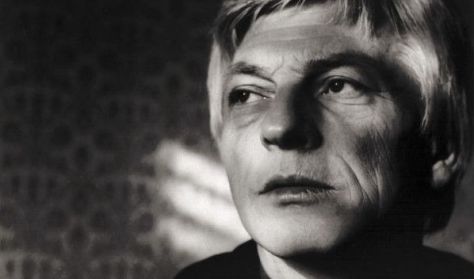
László Nagy / Poetry Recitals At Müpa Budapest
László Nagy is one of the most influential masters of 20th century Hungarian poetry.

László Nagy is one of the most influential masters of 20th century Hungarian poetry.
Ön egy múltbeli eseményre keresett rá. Kérjük, válogasson aktuális kínálatunkból a Jegy.hu keresőjében!
Last event date: Monday, February 06 2023 8:00PM
Poetry Recitals At Müpa Budapest
László Nagy
Multiple generations of Hungarians have enjoyed his poems, and the first appearance of his numerous volumes, published in batches of 20,000 copies, was always a major event. He enjoyed unrivalled popularity among Hungarian readers, and even those less enamoured with his work are agreed on his decisive role in the renewal of folk poetry. Though Nagy suffered undeserved criticism after his death, the appeal of his verse remains undiminished with the passage of time. Our show will demonstrate exactly why that is, as we listen to excerpts from his most memorable poems.
Nagy was born in 1925 the village of Felsőiszkáz in Veszprém County. In 1935, he developed osteomyelitis in his leg. He underwent several rounds of surgery, suffered damage to his nerves, and was forced to use a brace for the rest of his life. In July 1945, he graduated high school in the town of Pápa, before moving to Budapest to study graphic design at the Hungarian University of Arts and Design. At this time, he became an enthusiastic devotee of the Hungarian Folk College Movement and was swept away by the dazzling winds of change. His first book, Tűnj el fájás (Go Away Pain), was published in early June 1949, on Hungarian Book Day. Even though Nagy primarily worked as a translator at the start of the 1950s, he set out together with Ferenc Juhász to develop a new form of poetic language, lyricism and approach. In addition to his folk poetry, Nagy's most memorable translations included the works of García Lorca and Dylan Thomas, modern Polish poets, and ancient Chinese poetry. In 1959, he became a picture editor at the magazine Élet és Irodalom (Life and Literature). It would remain his place of work until his death, and in his later years he would become a senior figure at the publication. Although 1957 saw the release of the first edition of his poetry collection Deres majális (Frosty May Fair), he did not then publish anything until 1965. In that year, however, he achieved a breakthrough with Himnusz minden időben (Anthem For All Time). The following year - after three Attila József Awards - he received the Kossuth Prize, and his poetry went on to achieve immense popularity. He also enjoyed prestigious international recognition. Nagy's fellow artists played a key role not only in his general life, but also in his art: visual artists, filmmakers, and actors, including Kati Berek, Zoltán Huszárik, Béla Kondor, Zoltán Latinovits, Ferenc Sebő and Tamás Vígh all influenced him. Nagy published another collection of poetry in 1966, then a selection of his poems and translated works in 1967. His poems have been translated into at least 18 languages, with 11 foreign language versions of his books published since 1970. On 30 January 1978, he suffered a heart attack soon after recovering from the flu. He was buried at Farkasrét Cemetery on 6 February 1978. His headstone is the work of the sculptor Tibor Szervátiusz.
Featuring:
actors from the Hungarian National Theatre
piano: Ferenc Darvas
Creators:
Programme compiled by: Tibor Zalán
Director: Ödön Rubold
Macskabál van az elhagyott színház ódon színpadán. Minden évben egyszer megrendezik a bált, és erre összegyűlnek a környék - nagyon is emberi tulajdonságokkal felruházott - macskái. Eltáncolják és eldalolják életüket.
After years of tremendous success, on October 16, 2026, world-renowned violinist and conductor André Rieu will once again return to the stage of the MVM Dome!
Magyarországi bemutató Az Erkel Színház előadása ELŐADÁSOK: 2026. augusztus 14., 15.,16., 20., 21., 22. tervezett esőnapok: augusztus 17., 18., 23., 24.
A Michael Flatley által létrehozott Lord of the Dance 30 éves jubileumát ünnepli 2026-ban!
item(s) in basket
total:
Time limit has expired. Please, put item(s) in to basket again.